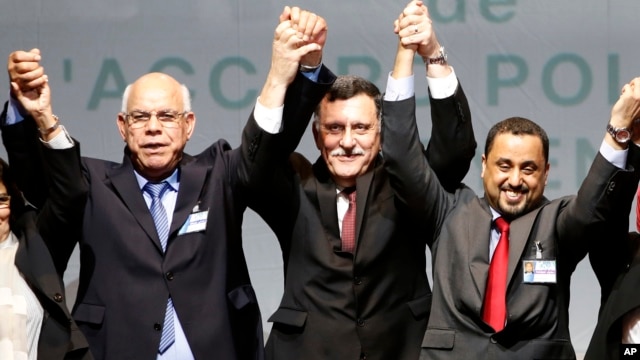News / Middle East
UN Security Council Unanimously Backs Libya's New Unity Government
Libyan representatives from rival factions, left to right, Mohammed Chouaib, Fayez Sarraj, and Dr. Saleh Almkhozom react after signing a U.N.-sponsored deal aiming to end Libya's conflict, Dec.17, 2015 in Sikhrat, Morocco.
December 23, 2015 6:12 PM
The United Nations Security Council on Wednesday unanimously gave its backing to the new Libyan unity government agreed to last week and urged all U.N. members to fully support the deal.
The British-sponsored resolution called on the new Libyan Presidency Council to follow through on plans to form a new government within 30 days, while also making arrangements for its own security.
Libya's U.N. ambassador, Ibrahim Dabbashi, told the Associated Press he would like to see the U.N. relax its arms embargo against Libya so his country can defend itself against the Islamic State (IS) group without the need for Western-backed airstrikes.
The Security Council condemned all acts of terrorism in Libya carried out by IS and its supporters, and voiced concern about Libya's grave humanitarian situation.
It also called on the new government to ensure full participation of women in all decisions as Libya transforms itself into a thriving democracy.
The new unity government brings together the self-proclaimed Islamic administration in Tripoli and the internationally-recognized government in the eastern city of Tobruk.
Lawmaker Fayez Sarraj of the Tripoli faction will be the new prime minister. He will head a nine-member governing council and a presidential council with ministers from both rival administrations.
Libya has been in chaos and political limbo since longtime strongarm leader Moammar Gadhafi was toppled and killed in 2011.
The instability and non-stop fight for power by numerous tribes and factions has wrecked the Libyan economy and brought the oil industry to a near standstill.


No comments:
Post a Comment